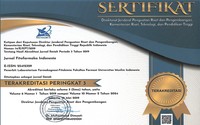Pengaruh Ekstrak Pogostemon cablin Benth terhadap Interleukin-6, Glukosa Darah, Hemoglobin dan Hematokrit pada Tikus Wistar yang Diinduksi Dietilnitrosamin
Abstract
Mortality and morbidity rates of hepatocellular carcinoma continue to rise worldwide. The role of inflammation, regulation of glucose metabolism, and anemia is widely studied concerning the development and life expectancy of patients with hepatocellular carcinoma. In several cancers, efforts to develop Pogostemon cablin benth plant potential drug candidates for hepatocellular carcinoma have been carried out at metabolomic, proteomic, and molecular levels. However, no studies have been found regarding the study of anti-inflammatory effects, metabolism, and anemic conditions of Pogostemon cablin benth intervention in hepatocellular carcinoma. This study is a pre-post experimental in-vivo study aimed at looking at the ability of Pogostemon cablin benth extract against interleukin-6 (IL-6) as an inflammatory marker, blood glucose levels as a marker of metabolic regulation and hemoglobin and hematocrit levels at as markers of anemia in hepatocellular carcinoma. A model of hepatocellular carcinoma was performed in 25 peritoneal-induced diethylnitrosamine-induced Wistar rats. The mice were divided into five groups, namely group 1 (K1), group 2 (K2), group 3 (K3), positive control (KP), and negative control (KN). Pogostemon cablin benth ethanol extract was administered orally to mice K1 40mg/kg body weight; K2:80mg/kg rat body weight; K3:120mg/kg body weight, while the positive control group was given Sorafenib. Interleukin-6 levels were measured using the enzyme-linked immunoassay principle, while glucose, hemoglobin, and hematocrit levels were measured using the enzymatic principle of glucose dehydrogenase-flavin adenine dinucleotide (GDH-FAD). The study showed no difference in blood glucose levels of mice between pre- and post-induction diethylnitrosamine. Induction of diethylnitrosamine obtained significantly led to a significant decrease in hemoglobin levels (15.54 g/dl ±1.28 vs. 14.31 g/dl ±1.11) and hematocrit (45.83% ±3.77 vs 42.20% ±3.25) levels between pre and post-induction. Mice in group 1 (K1) showed a significant increase in blood glucose levels between pre and post-oral Pogostemon cablin benth extract (p<0.05). There was no significant difference in hemoglobin and hematocrit levels in the treatment group between pre-intervention Pogostemon cablin benth extract. However, KN that did not receive Pogostemon cablin benth extract intervention significantly decreased hemoglobin and hematocrit levels (p<0.01). Decreased levels of the pro-inflammatory cytokine IL-6 occurred in K2 (p<0.05) after receiving oral Pogostemon cablin benth extract intervention. Based on this study, Pogostemon cablin benth extract may decrease IL-6 levels and is thought to influence hemoglobin and hematocrit levels in diethylnitrosamine-induced Wistar rats.
Full Text:
PDF (Bahasa Indonesia)DOI: https://doi.org/10.33096/jffi.v11i1.1092
Copyright (c) 2024 Authors

This work is licensed under a Creative Commons Attribution-ShareAlike 4.0 International License.
Indexed by:
ISSN: 2356-0398 | e-ISSN: 2541-2329
Editor's Address:
Third Floor Pharmacognosy-phytochemistry laboratory building, Urip Sumoharjo road km. 5 Campus II UMI, Makassar, South Sulawesi, Indonesia
Phone: +6281524045514
Fax: +62411425619
E-mail: editorjfi@umi.ac.id

















.jpg)

